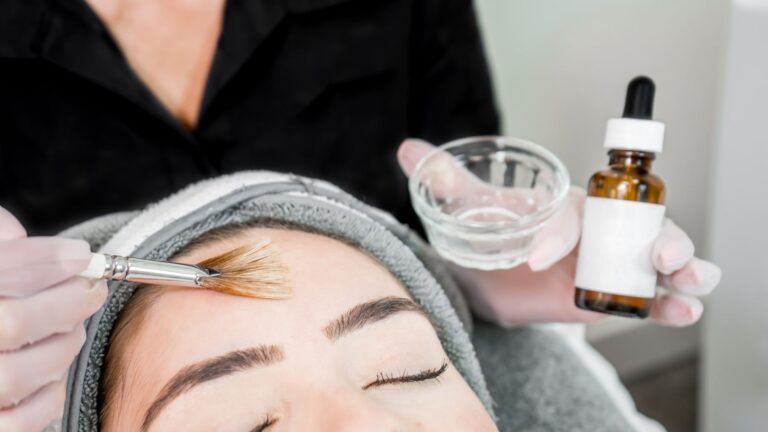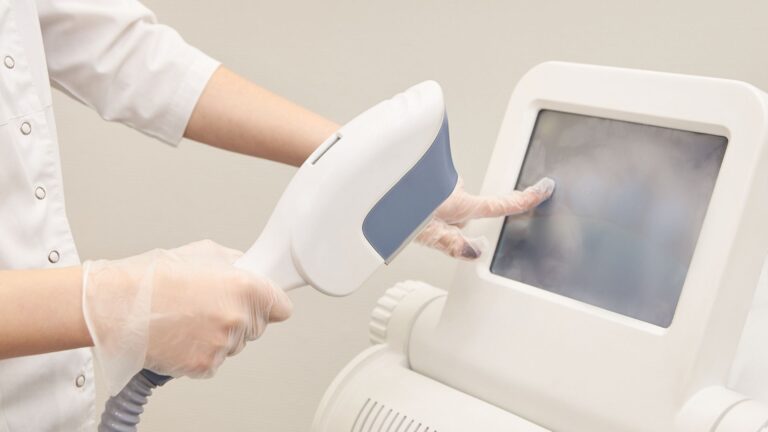Does a Hydrocolloid Bandage Really Help to Treat Acne?
There’s lots of buzz around TikTok videos using conventional over-the-counter hydrocolloid bandages as acne remedies. Hydrocolloid dressings have been used in wound care for many years because of their absorbent properties and ability to form a protective layer on the skin. Since an acne cyst or a pimple is not that different from a wound, treating mild to moderate acne is a natural extension of this technology.
TikTok’s skin care content continues to go viral, but it is important to keep in mind that many beauty trends are coming from non-experts and are potentially harmful.
How does Hydrocolloid Technology work on Acne?
Hydrocolloids are a growing and innovative category of dressings that have properties similar to those found in gels, but with an adhesive applied on top. They’re available in different shapes like films or sheets for example – all you need is the carrier material known as hydrophilic (water-loving) polymers with a sticky adhesive.
According to a top dermatologist in New York, hydrocolloid bandages can be used as a local spot treatment for acne cysts or nodules. Hydrocolloids create a protective barrier over the skin which keeps extra oil and pus out, thereby flattening pimples faster. Also, they promote natural healing by sealing in moisture and acting as a protective layer that prevents touching the acne spots. The truth is, most people can’t resist touching their acne or pimples (thereby introducing bacteria and other external contaminants) or picking at them, which increases inflammation and delays healing. Dermatologists and many clinicians appreciate the fact that hydrocolloids adhere to both moist and dry skin; unlike most other dressings, that only adhere to dry skin.
Hydrocolloid patches are a great way to cover up your skin imperfections. They’re thin and flexible, making them perfect for use during the day or at night because makeup foundation or concealer can be applied on top. More importantly, the bandages can be worn anywhere on the body and are perfect for those with sensitive skin or problem areas with weird shapes like around the nose bridge area or inside the ears where one might need constant coverage.
How Hydrocolloids Treat Maskne?
The COVID-19 epidemic has caused a rise in the number of acne breakouts that are due to wearing masks. Maskne, a combination of the words mask and acne, was coined in 2020 and refers to acne or skin irritation that occurs on the face (especially on and around the nose and chin) from wearing a face mask regularly. Covering our faces impairs natural skin shedding, clogs pores, and leads to dead cells collecting on our faces, which can allow germs or other organisms to multiply! As a result, dermatologists are seeing an increase in some types of acne, especially “perioral dermatitis,” which generally affects the face and nose. Wearing a hydrocolloid patch under the mask can help with acne while also reducing the likelihood of additional irritation or breakouts.
What Are The Disadvantages Of Using Hydrocolloid Bandages?
Hydrocolloid bandages are an excellent, low-cost option for people with acne and/or sensitive skin. These waterproof dressings can be washed and left in place to heal acne lesions under the covering while they flatten out the acne cyst or other affected area – all without allowing you to pick at your acne scabs!
While hydrocolloid bandages work best as spot treatment for acne, one should not apply hydrocolloid sheets to the entire face. When the outer skin layer of healthy skin is covered, it can interfere with the proper functioning of the outer skin layer.
TikToker-ers also recommend hydrocolloid sheets instead of hydrocolloid spots because the sheets can be cut into smaller sizes and thus cost less. When trimming the bigger sheets down to size, be careful not to contaminate them. Use clean scissors and wash your hands or wear gloves.
Over-the-counter topical acne medications that contain adapalene, benzoyl peroxide, or salicylic acid can also be effective, but may irritate and dry out the affected areas as well as cause more discomfort than relief.
What Are The Advantages Of Using Hydrocolloid Bandages for acne?
- By protecting your pimple from rubbing and touching you can prevent infection and scarring caused by rubbing and touching (whether you do so subconsciously or just rub your face on your pillow at night).
- By creating a moist environment, faster and better healing can be achieved
- Active ingredients can be delivered to your pimple and the bandage can help them penetrate more deeply
- They can absorb fluid from your pimple
- Your pimple will be protected from Ultra Violet light, thus reducing pigmentation
- Since they’re usually waterproof, you don’t have to reapply them every time you wash your face
Hydrocolloid bandages are best utilized for acne by following these 3 steps:
- Make sure you are not allergic to skin adhesives present in bandages: Some individuals are sensitive to the adhesive glue in hydrocolloid bandages, so if your skin becomes irritated or otherwise more painful, you should discontinue them immediately.
- Wash your skin thoroughly to remove skin oils or apply alcohol skin wipes to remove excess skin oil. Hydrocolloid bandages adhere more easily and longer to clean, dry skin.
- Change it as needed, then leave it in place for 3-5 days to get the most out of the hydrocolloid components.
What About other Topical Wound Ointments for acne?
Some skincare influencers on social media swear by Neosporin as a spot treatment for acne as well. After all, it’s antibacterial, so it has to be beneficial in treating acne, right? Not so, according to Top Dermatologists. Neosporin is a petroleum-based antibiotic medication that can potentially clog your pores. It is recommended to use antibiotics that target acne, as Neosporin targets different bacteria. Acne medications contain combinations of active ingredients aimed at treating the bacteria that cause acne as well as other causes of acne.
Frequently Asked Questions: Hydrocolloid Dressings
What are hydrocolloid dressings?
Hydrocolloids are a type of dressing containing gel-forming agents, such as sodium carboxymethylcellulose (NaCMC) and gelatin. In many products, these are combined with adhesives and applied to a film, to form an absorbent, self adhesive, waterproof wafer.
What are the main indications for hydrocolloid dressings?
Hydrocolloids are easy to use, need to be changed only every 3 to 5 days, and do not cause any trauma when removed. They are suitable for clean, healing, superficial wounds with low to medium exudate, such as acne blemishes.
Hydrocolloids provide a physical barrier that prevents the spread of skin infection including MRSA infection and can soften dry wounds.
Are there any side effects of hydrocolloid dressings?
In rare cases, hydrocolloid wound dressings can cause contact dermatitis. Hydrocolloid wound dressings have been in use for about 20 years, with little association with allergic contact dermatitis. Nonetheless, some hydrocolloid dressings use rosin as a binding agent, and this substance retains the sensitizing properties of colophony.
What is the role of hydrocolloids in treating acne scars, hypertrophic scars and keloids?
The use of silicone gel sheeting in treating keloids and hypertrophic scars has been investigated. The treatment is believed to improve scar hydration. In a randomized controlled prospective study, a hydrocolloid dressing that promotes a moist environment was evaluated. The scar size and volume, color, patient symptoms, and transcutaneous oxygen measurements were measured. The study found that both treatments significantly reduced itching, reduced pain, and increased pliability over the course of two months. According to the authors, hydration of the scar resulted in symptomatic improvement, but no change in physical parameters.
Is there any difference between brands?
Yes. Many differences exist in terms of structure, flexibility, dimensions, fluid handling properties, etc. The problem is that few studies have compared different brands. Due to a lack of clinical research studies, manufacturers tend to base their claims on indirect comparisons, such as those based on rival studies comparing hydrocolloids with parafin gauze. One or two comparisons of ‘patient satisfaction’ have been published, but these have no clinical value. They are merely “marketing claims”.
Come And Visit The Best Dermatologist In New York City.
Dr. Adebola Dele-Michael, MD is the founder of Radiant Skin Dermatology & Laser, a multilocation dermatology practice offering unique, cutting-edge expertise and beautiful facilities in Manhattan, NYC (midtown Manhattan, Harlem, and Washington Heights). She is a top African American dermatologist in New York City. Book a consultation with her today!

Adebola Dele-Michael, MD
After helping thousands of people with skin and hair challenges, Adebola Dele-Michael, MD covered a wide range of topics in the skin and hair industries. Her mission is to fill the knowledge gap in caring for hair and skin of color.





